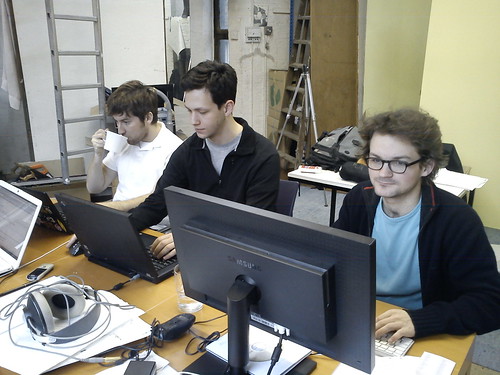One Of These Guys Is Brilliant

Stijn Debrouwere (right) is down in Cedar Rapids, Iowa, thinking great thoughts about the future of media. (Photo: Flickr.com)
Every once in a while — OK, pretty often, actually — I run across something so smart it makes me wish I’d written it. I ran across such an item by a guy I’d never heard of on a site I’d never heard of. But I expect I’ll be hearing more about him in the future.
Stijn Debrouwere lives in Cedar Rapids, Iowa, where he creates information architecture for the local newspaper and TV station. And he recently posted on his blog a long item about the many information sources that are replacing traditional journalism.
It’s worth a read, but I’ll highlight a few of his key points. Some of these bullet points are direct quotes and some are my paraphases.
- People used to read about music because that was one of the few ways you could explore music in the pre-Web era. With services like Spotify and Rdio, you don’t need to read about new music — you can discover it immediately, with no intermediary.
- Follow the right people and organizations on Facebook and Twitter, and you’ll find out what’s happening close to you, straight from the source. LocalWiki, Pinwheel, Facebook, Twitter and Foursquare clearly do not replace a good local newspaper, but they offer a combo that is increasingly becoming good enough.
- Quora looks like a simple Q&A site, but it’s also a reinvention of the ask-an-expert column you can find in almost any newspaper and magazine.
- There are organizations and websites everywhere that are taking over newspapers’ role as tastemaker and watchdog and forum. These disruptors don’t replace investigative reporting, but they replace the other 95% of what made professional news organizations important.
“This is not sharing cat pictures, this is stuff that matters,” he writes. “People can read the health section in their newspaper and get drip-fed badly researched advice about how to live a healthy life, or they can visit the NIH or the Mayo Clinic online, or create an account on one of the many bulletin boards about anything from fitness to dealing with cancer.”
The traditional media haven’t found the right ways to get people to pay for news and media online, but these other sites have. It’s not journalism as we’ve known it, but it’s information that matters in people’s lives.
While the traditional media cry in their beer, Debrouwere writes, the rest of the Web world is “having a party on the other side of the river with their not-really-reporting and sort-of-journalism and maybe-media.”
Journalists are slowly realizing that their competition isn’t just other online news sites and services; it’s every other thing that is competing for people’s time, attention and money online.
I’ve been reading these essays on the future of journalism for at least five years. I’ve read dozens, maybe hundreds of them. Debrouwere’s is one of the clearest and smartest I’ve seen. If you’re at all interested in how people get and use information (and most people reading this blog are), it’s worth a look.